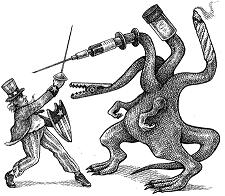 Although the reporting has improved in recent years, U.S. media coverage of the "war on drugs" continues to ignore the economic realities of just who is fighting who in the conflict. The drug war is best understood as a battle of dollar versus dollar -- a bloody war between the dollars of U.S. taxpayers and the dollars of U.S. consumers.
Although the reporting has improved in recent years, U.S. media coverage of the "war on drugs" continues to ignore the economic realities of just who is fighting who in the conflict. The drug war is best understood as a battle of dollar versus dollar -- a bloody war between the dollars of U.S. taxpayers and the dollars of U.S. consumers.
On one side, Americans pay large sums of money to vast networks of people who grow, process, ship, smuggle, defend, and deliver drugs to the U.S. On the other side, Americans also pay another network of people vast amounts to find, fight, arrest, and kill those who we hired to provide the drugs to begin with.
Few tend to think of U.S. buyers of illicit drugs as "consumers." To use that word is to seemingly legitimize illicit drug consumption as a form of economic activity. But all activities that involve trading currency for a product -- and plenty of activities that don't -- are inherently economic in nature. A 2006 Congressional Research Service report estimated that Americans spend "over $60 billion" annually on illicit drugs. Andres Martinez of the New America Foundation told Newsweek that the number was some $65 billion.
These billions are the commerce of a wealthy First World nation. Sure, America is in a recession. And yes, our economic outlook is glum. But even as many Americans face unemployment and foreclosure, it remains true that life for average Mexicans and others in developing nations is far less prosperous. As a result, the money used by Americans to buy illicit drugs has massive buying power once converted into pesos and other currencies of poorer economies.
These U.S. pesos pay the salaries of drug traffickers, peasant growers, and corrupted government officials. The U.S. pesos even come back into the American economy, as drug traffickers spend a portion of their profits buying American weapons that they smuggle back into Mexico.
Meanwhile, there is the other side of the equation: a massive flow of American tax dollars that is spent fighting the very people who are paid by Americans to provide illicit drugs. Some of those tax dollars go directly into U.S. military efforts at interdiction. Others dollars fund anti-corruption and anti-drug units in Mexico and elsewhere. Additional sums of money make their way south in the forms of military training and hardware.
In 2009, almost $6 billion was authorized by Congress for the Pentagon, State Department, and Department of Homeland Security to spend on programs "to disrupt the flow of illicit drugs into the United States, and provide support to partner nations." This includes the hundreds of millions in aid to countries ranging from Mexico to Colombia. Mexico alone has been promised $1 billion in multi-year aid for its battles.
Thus, all of Latin America is essentially a proxy battleground between U.S. taxpayers and U.S. drug consumers. While there are certainly many Latin American drug consumers, U.S. drug consumers dwarf their Latin American peers in size and scope. According to the U.N.'s 2009 World Drug Report, for every one cocaine user in South America, there are three in North America. The U.S. "is still the world's largest cocaine market."
Today, governments across Latin America appear to be increasingly fatigued with the scars they must bear as a result of this battle. Many are narrowing their involvement in the drug war, notably without protest from the Obama Administration. As reported recently by Reuters:
Convinced that the four-decade-old, U.S.-led war on drugs has failed, Argentina, Brazil, Chile, Ecuador, Mexico and other countries are relaxing penalties for possession and personal use of small amounts of narcotics. Critics warn drug abuse and violence will rise if the small-scale consumption of cocaine, marijuana and other drugs is tolerated, but policy makers in much of Latin America argue the new laws will free up resources to go after big traffickers and treat addicts... U.S. President Barack Obama's administration has voiced little opposition to the changes.
This trend reveals that Latin American nations are becoming less willing to play host to the outsourced drug war between American taxpayers and American consumers. So long as U.S. dollars finance both sides of this bloody international battle, it makes little difference what is done anywhere else.
